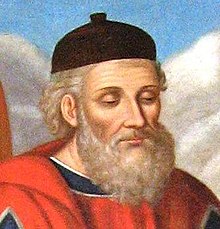Diodorus Siculus or Diodorus of Sicily (Greek: Διόδωρος, translit. Diódōros; fl. 1st century BC) was an ancient Greek historian. He is known for writing the monumental universal history Bibliotheca historica, in forty books, fifteen of which survive intact,[1] between 60 and 30 BC. The history is arranged in three parts. The first covers mythic history up to the destruction of Troy, arranged geographically, describing regions around the world from Egypt, India and Arabia to Europe. The second covers the time from the Trojan War to the death of Alexander the Great. The third covers the period to about 60 BC. Bibliotheca, meaning 'library', acknowledges that he was drawing on the work of many other authors.
Diodorus Siculus | |
|---|---|
 Diodorus Siculus as depicted in a 19th-century fresco | |
| Native name | Διόδωρος |
| Born | fl. 1st century BC Agira, Sicily |
| Language | Ancient Greek |
| Genre | History |
| Notable works | Bibliotheca historica |
Life
According to his own work, he was born in Agyrium in Sicily (now called Agira).[2] With one exception, antiquity affords no further information about his life and doings beyond his written works. Only Jerome, in his Chronicon under the "year of Abraham 1968" (49 BC), writes, "Diodorus of Sicily, a writer of Greek history, became illustrious". However, his English translator, Charles Henry Oldfather, remarks on the "striking coincidence"[3] that one of only two known Greek inscriptions from Agyrium (Inscriptiones Graecae XIV, 588) is the tombstone of one "Diodorus, the son of Apollonius" (“Διόδωρος ∙ Ἀπολλωνίου”) .[4][5] The final work attributed to him is from 21 BC.[6]
Work

Diodorus' universal history, which he named Bibliotheca historica (Greek: Βιβλιοθήκη Ἱστορική, "Historical Library"), was immense and consisted of 40 books, of which 1–5 and 11–20 survive:[7] fragments of the lost books are preserved in Photius and the Excerpts of Constantine Porphyrogenitus.
It was divided into three sections. The first six books treated the mythic history of the non-Hellenic and Hellenic tribes to the destruction of Troy and are geographical in theme, and describe the history and culture of Ancient Egypt (book I), of Mesopotamia, India, Scythia, and Arabia (II), of North Africa (III), and of Greece and Europe (IV–VI).
In the next section (books VII–XVII), he recounts the history of the world from the Trojan War down to the death of Alexander the Great. The last section (books XVII to the end) concerns the historical events from the successors of Alexander down to either 60 BC or the beginning of Julius Caesar's Gallic Wars. (The end has been lost, so it is unclear whether Diodorus reached the beginning of the Gallic War as he promised at the beginning of his work or, as evidence suggests, old and tired from his labours, he stopped short at 60 BC.) He selected the name "Bibliotheca" in acknowledgment that he was assembling a composite work from many sources. Identified authors on whose works he drew include Hecataeus of Abdera, Ctesias of Cnidus, Ephorus, Theopompus, Hieronymus of Cardia, Duris of Samos, Diyllus, Philistus, Timaeus, Polybius, and Posidonius.
See also
References
Bibliography
Further reading
External links
Wikiwand in your browser!
Seamless Wikipedia browsing. On steroids.
Every time you click a link to Wikipedia, Wiktionary or Wikiquote in your browser's search results, it will show the modern Wikiwand interface.
Wikiwand extension is a five stars, simple, with minimum permission required to keep your browsing private, safe and transparent.
